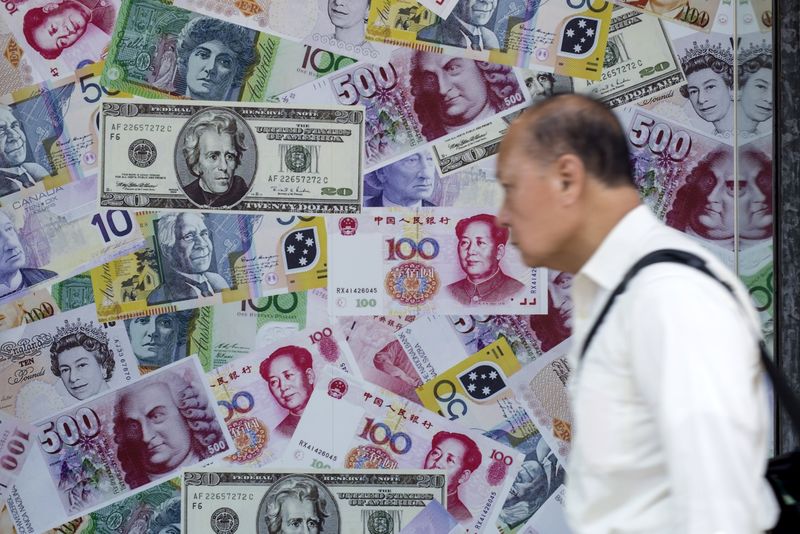By Mike Dolan
LONDON (Reuters) - China's summer shock may mark the end of an era of globalisation that helped define world markets for more than a decade.
Investor anxiety about the consequences is well-founded.
Beijing's integration into the global economy since 2002 reshaped the financial as well as economic landscape - mainly by the way China itself and the economies it supercharged with outsize demand for raw materials banked the hard cash windfalls they earned over the following 12 years.
According to the International Monetary Fund, the dollar value of foreign currency reserves held by all developing nations ballooned by almost $7 trillion in just one decade to a peak of some $8.05 trillion by the middle of last year.
While China was the main driver, accounting for about half of that increase, its economic boom created a commodity supercycle that flooded the coffers of resource-rich nations from across Asia to Russia, Brazil and the Gulf.
As the vast bulk of this hard cash was banked in U.S. Treasury and other low risk, rich-country bonds, they were at least one critical factor in the halving of U.S. Treasury and other Group of Seven government borrowing costs over the same period.
Alongside the disinflationary impact of China's low cost labour on western goods imports and wages, this reserve stash helped extend what has now been a 20-year bull market in bonds.
What's more, the drop in yields, by skewing relative returns between stocks and bonds and also the relative cost of capital for companies, also at least partly underwrote a post-credit crisis surge in equity prices to successive records.
Reverse that bond buying, even at the margin, and world asset markets may have a major problem.
That's especially so at a time when the big other marginal bid for bonds, the U.S. Federal Reserve's quantitative easing programme, has ended and when western recoveries are pressuring the Fed and others to normalize near zero interest rates.
RESERVE GROWTH CRESTS
As China's economy slows to its weakest in 25 years this year and capital flows out of the country, pressure on the recently devalued and loosened yuan peg means the People's Bank of China has sold hundreds of billions of dollars to shore up its currency over the summer.
Dutch bank Rabobank estimated China's central bank sold $200 billion of reserves in the last weeks of August alone.
Along with the pressure of looming Fed tightening and a higher dollar, the ebb of Chinese demand for commodities and slump in energy and metals prices has seen emerging market currencies plummet everywhere. And just steadying the capital exit is starting to strain their coffers.
Emerging market forex reserves fell by about half a trillion dollars between mid-2014 and the end of the first quarter of 2015, IMF data shows, and this is likely far from the end.
Deutsche Bank (XETRA:DBKGn) estimated on Tuesday the high water-mark of almost two decades of reserve accumulation had now been reached and central banks will by the end of next year dump as much as $1.5 trillion to counter capital outflows.
Bond investors are nervous of the fallout.
"The process of reserve reversal has only just started," said Chris Iggo, Chief Investment Officer, Fixed Income at Axa Investment Managers.
"We could be on the verge of a scenario that sees a reversal in the trend of declining global goods prices, a partial reversal in U.S. monetary policy and a reversal of the balance sheet expansion that allowed emerging market central banks to grow their foreign exchange reserves," he added. "The upshot? Significantly higher US Treasury yields."
DEFLATION OR RESERVE BUST?
For some, it may seem counter-intuitive that a China slowdown or financial shock lifts bond borrowing rates at all.
As the Shanghai stock bubble imploded in July, the yuan wobbled and the world's second-biggest economy shuddered, the first wave across markets was to sink commodity prices further, throw doubt on inflation targets and lower long-term interest rate horizons yet again.
It's not hard to see why. Crude oil prices, which had already halved over the previous 12 months, lost another 19 percent after midyear to six-year lows. Raw material prices more broadly, as captured by the Thomson Reuters Commodity Research Bureau's index, slumped to their lowest in 12 years.
The effect of international commodity price moves on already near-zero inflation rates was to push back the expected timing of interest rate rises in the United States, Britain and elsewhere. Suddenly, silver linings for investors reappeared.
But the parallel narrative of the decade-long reserve unwind could well neutralize much of that for bond pricing.
Iggo pointed out that even as China's emergence over the past 15 years fuelled a trebling of the CRB commodity price index in just six years to 2008, it was disinflationary on balance for western economies - mainly due to low-cost labour and exports.
The flip side now is that the recent slump in the CRB to 2003's lows may not be enough to prevent cost pressures building in recovering western economies over time and may only stay central bank tightening temporarily as a result.

"The peak in bond demand is probably behind us," said Deutsche strategist George Saravelos.
(Graphics by Vincent Flasseur; Additional reporting by Jamie McGeeever; Editing by Hugh Lawson)